In What Ways Can Companies Leverage Leading Practices for Good Governance?
In 2019, REITs again demonstrated a commitment to institutionalizing good governance policies and practices across their organizations, with 100% of Nareit's members that reported to GRESB stating that their organization discloses policies on relevant governance issues. Governance structures and protocols increasingly reflect and support integration of ESG strategies and objectives.
Aligned with leading governance practices, many REITs have formed interdepartmental ESG committees that include C-suite and board-level representation as well as cross-functional and often cross-regional groups comprising employees from different levels of the company. Many of these committees have specific responsibilities for developing, overseeing, and deciding on ESG initiatives.
These groups are tasked with guiding organizational ESG goal setting and performance monitoring. In 2019, 82% of U.S. REITs reporting to GRESB disclosed that ESG factors were included in performance targets, with leading companies making efforts to tie executive compensation to specific ESG metrics.
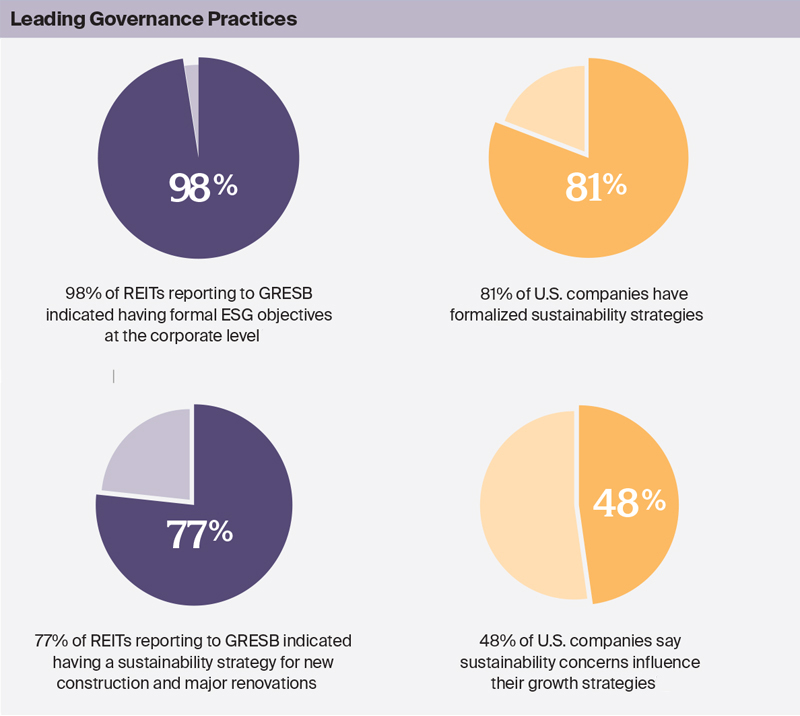
How Can REITs Embed ESG Roles & Responsibilities Throughout the Organization?
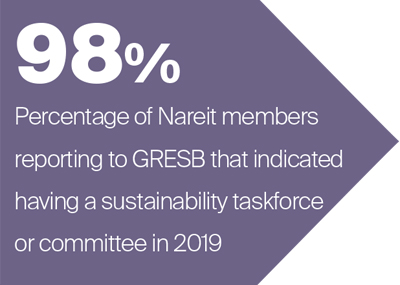 Establishing good ESG governance starts with defining clear ESG roles and responsibilities for the company’s ESG staff, management, executives, and board members.
Establishing good ESG governance starts with defining clear ESG roles and responsibilities for the company’s ESG staff, management, executives, and board members.
A majority of the REITs have established ESG governing bodies, in the form of a sustainability taskforce or committee, to oversee the development, implementation, and monitoring of corporate sustainability efforts.
These ESG governing bodies often work in collaboration with dedicated ESG staff and have formal responsibilities, board participation, and regular reporting schedules.
As sustainability issues cut across a diverse spectrum of core business operations, there has been a trend toward ensuring that ESG governing bodies and teams are cross-functional by design and include not only regional representation, but also different levels of employees within the organization. In the 2019 GRESB survey, 62% of REIT ESG task forces or committees included at least one board member.
Beyond developing ESG committees, the real estate industry has demonstrated investment in ESG governance by allocating dedicated staff to ensuring progress and performance. In 2019, 98% of REITs reporting to GRESB had at least one note the change overseeing sustainability.
Case Study:
Hudson Pacific Properties, Inc.: Governing ESG from the Top Down and the Bottom Up
Vornado Realty Trust: Leveraging Investor Engagement for Industry-leading ESG Reporting and Disclosure
How Can REITs Link Compensation to ESG Performance Metrics?
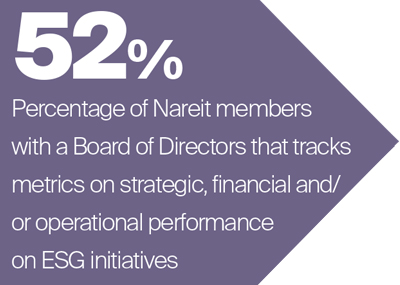 REITs have begun to implement policies that tie compensation for different employees to company ESG metrics. Currently, 81% of Nareit members reporting to GRESB include ESG factors in employee performance targets.
REITs have begun to implement policies that tie compensation for different employees to company ESG metrics. Currently, 81% of Nareit members reporting to GRESB include ESG factors in employee performance targets.
Leadership compensation linkage to ESG goals is also emerging as a leading practice for ESG performance management and accountability. Companies with strong links between executive compensation and ESG performance are found to be 2.1 times more likely to have stronger ESG performance.
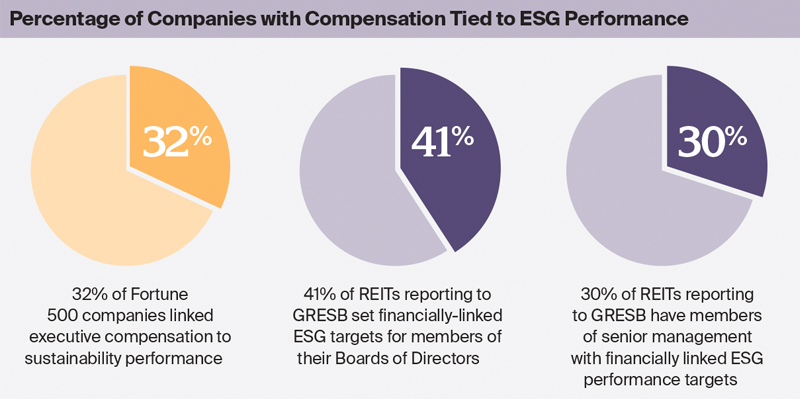
Case Study:
Kilroy Realty Corp.: Tying Executive Compensation to ESG Metrics
How Should Companies Integrate ESG into Corporate Risks Assessments?
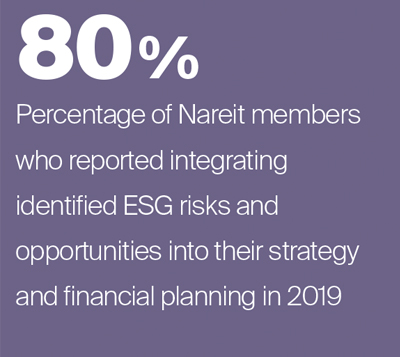 ESG risks are now considered among top global economic risks, making ESG risk assessment and mitigation a critical focus area for the real estate industry. In order to consistently and successfully manage ESG risks, leading practice is to fully integrate ESG issues into corporate risk management practices.
ESG risks are now considered among top global economic risks, making ESG risk assessment and mitigation a critical focus area for the real estate industry. In order to consistently and successfully manage ESG risks, leading practice is to fully integrate ESG issues into corporate risk management practices.
REITs demonstrate leadership in ESG risk assessment and integration practices, as highlighted by the 80% of 2019 Nareit Member Survey respondents reporting that their companies integrate ESG risks and opportunities into corporate strategy and financial planning, compared to 29% of World Business Council for Sustainable Development member companies that report risk management of their top ESG issues.
With ESG risks ranging from climate change and flooding to cybersecurity and employee health and safety, REITs have increasingly found that approaching ESG risks through good governance practices that promote shared responsibility across every level and function of an organization is critical to effective risk management.
Case Study:
Regency Centers Corp.: Making Cybersecurity a Companywide Priority
What Progress Are REITs Making on Board Diversity?
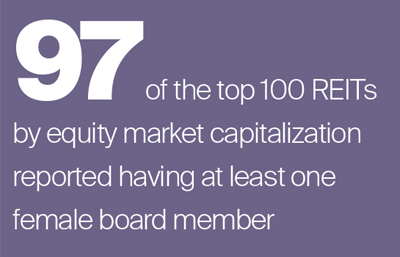 Diverse and inclusive workplaces and board representation are considered essential for the diversity of experience and thought needed to drive innovation and spur growth. Studies have shown that companies with diverse boards can generate higher profits and companies with highly gender-diverse executive teams are more likely to outperform their peers. REITs recognize the value of diversity and inclusion, and have made it a priority to create more diverse boards and managements.
Diverse and inclusive workplaces and board representation are considered essential for the diversity of experience and thought needed to drive innovation and spur growth. Studies have shown that companies with diverse boards can generate higher profits and companies with highly gender-diverse executive teams are more likely to outperform their peers. REITs recognize the value of diversity and inclusion, and have made it a priority to create more diverse boards and managements.
One way REITs are encouraging board diversity is through mandatory board refresh policies. A 2019 Harvard University study on corporate governance found that board renewal rates remain higher today than in the previous 10 years and that boards are increasingly adding new directors to expand perspectives and representation.
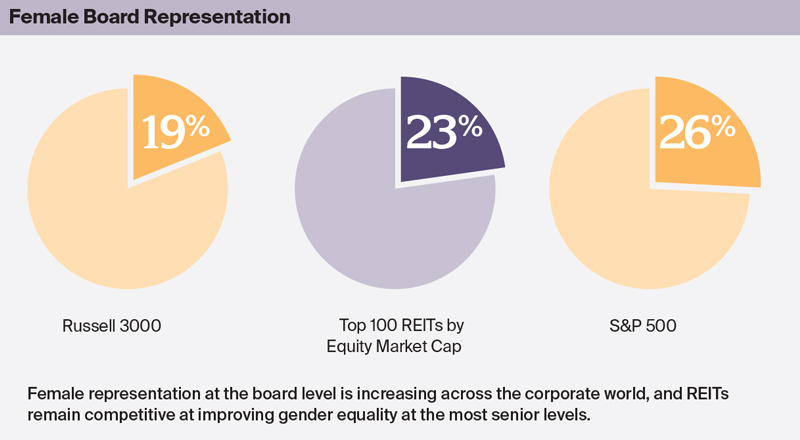
In a 2019 study that assessed diversity and inclusion among S&P 500 companies, Wall Street Journal analysts ranked industries on their level of board diversity, looking at age, gender, and independence. Among companies included in the analysis, the real estate industry performed competitively across all three areas, with all industries showing room to continue to improve gender representation.
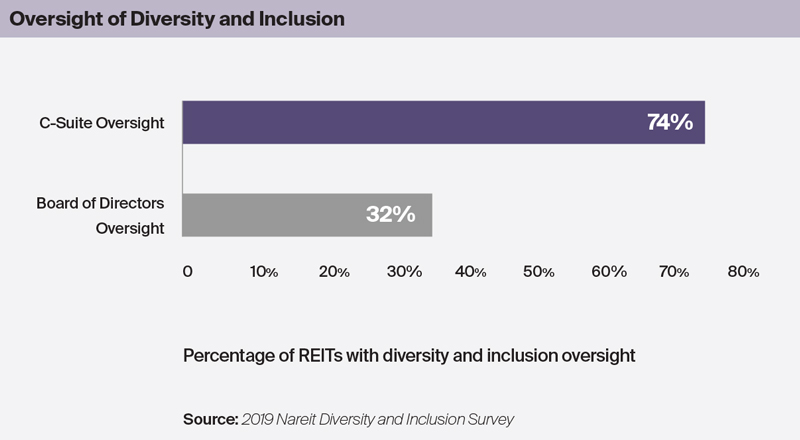
Download the 2020 REIT Industry ESG report
2019 Governance Case Studies
Welltower: Diversity and Inclusion
Ventas: Board Diversity Drives Performance Improvement
Kimco Realty Corporation: ESG Governance
Brookfield Properties: Implementing a Supplier Diversity Program for Long-Term Impact
Host Hotels & Resorts: Environmentally Responsible Supply Chain Management